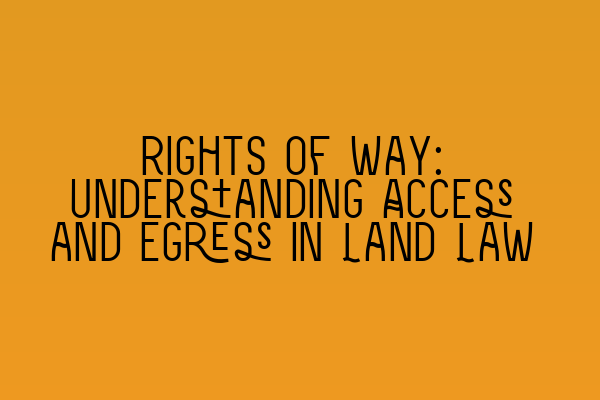Rights of Way: Understanding Access and Egress in Land Law
Welcome to this informative blog post brought to you by SQE Property Law & Land Law. In today’s discussion, we will delve into the intricate world of rights of way and help you gain a comprehensive understanding of access and egress in land law. Whether you are a property owner, a solicitor, or simply an individual seeking knowledge in this area, this article will provide valuable insights and guidance.
What are Rights of Way?
Rights of way are legal rights that allow a person to pass over another person’s land to access a particular destination. These rights can be crucial for property owners, businesses, and the general public, as they ensure proper access to properties, amenities, and transportation routes.
There are two main types of rights of way: public rights of way and private rights of way. Public rights of way are typically footpaths, bridleways, or byways that are maintained by local authorities. Private rights of way, on the other hand, are specific access routes granted to individuals or entities for private use.
Understanding Access and Egress
In land law, access refers to the ability to enter or reach a piece of land or property using a right of way. Egress, on the other hand, pertains to the freedom to exit from or leave a property through a right of way. Both access and egress are essential rights that enable proper use and enjoyment of a property.
It’s crucial to be aware that access and egress rights may come with certain limitations or conditions. For example, a right of way may be subject to specific hours of operation, the payment of fees, or the prohibition of certain activities. Therefore, it is essential to carefully review the terms and conditions of any right of way before relying on it.
Establishing and Preserving Rights of Way
The establishment and preservation of rights of way can be complex and require legal expertise. If you are looking to establish a private right of way or need to verify the existing rights of way over your land, it is advisable to consult a qualified solicitor who specializes in property law.
When it comes to public rights of way, local authorities are responsible for their establishment and maintenance. However, it is crucial to remember that the use of public rights of way can be restricted or altered by the local authorities, especially in cases where safety concerns or land development projects arise.
Disputes and Resolving Issues
Disputes related to rights of way can arise due to various reasons such as disagreements over usage, obstruction of access, or unauthorized changes to a right of way. In such situations, it is essential to seek legal advice promptly to understand your rights and obligations.
Mediation and negotiation can often help resolve disputes and reach amicable solutions. However, if a resolution cannot be achieved through these means, it may be necessary to take legal action to protect your rights. Again, consulting with a solicitor who specializes in property law will be invaluable in navigating these situations.
Conclusion
Rights of way are crucial aspects of land law that govern access and egress to and from properties. Understanding the different types of rights of way, their establishment and preservation, and the resolution of disputes is vital for property owners and legal professionals alike.
At SQE Property Law & Land Law, we specialize in providing expert legal advice and guidance related to rights of way and all aspects of property law. If you require assistance in this area, please contact us for professional support.
To further enhance your knowledge in property law and land law, we recommend exploring the following articles:
